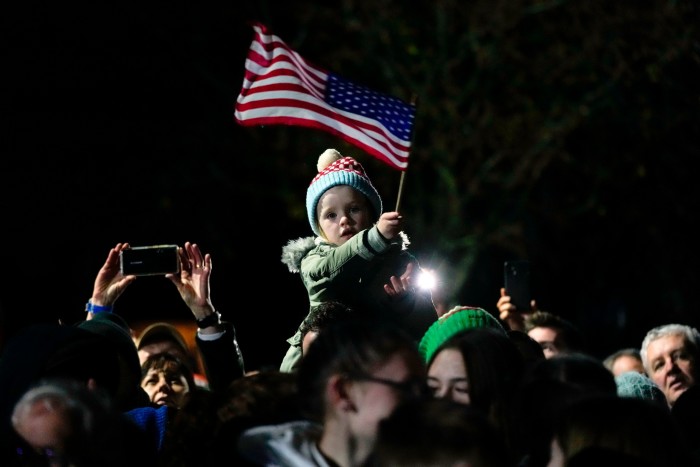In Ballina, a small town in County Mayo, in the west of Ireland where his ancestors once lived, US president Joe Biden gave a rousing campaign-style speech on Friday night that appeared to set the stage for a re-election bid in 2024.
Standing in front of Saint Murdeach’s Cathedral, on the banks of the River Moy, before an estimated crowd of 27,000 people, Biden traced his family’s history, echoed the slogans of his 2020 presidential campaign, and struck an optimistic note about the future.
“This is a moment to recommit our hearts, our minds, our ardent souls to the march of progress; to lay the foundations, brick by brick by brick, for a better future for our kids and our grandkids, one of greater liberty, opportunity, and dignity, just like our ancestors did for us,” the president said to a crowd who had braved cold, wet weather to wave Irish and American flags.
“I have never been more optimistic, and I’ve been doing this a long time . . . about what we can achieve if we stick together and stick to our values,” he said. “This is a time of enormous possibilities.”
Friday night’s speech capped a four-day tour that started in Belfast, Northern Ireland, to mark the 25th anniversary of the Good Friday Peace Agreement. It continued south of the border with official meetings with the Irish president and prime minister, taking in several small towns and villages to which Biden has traced his family’s roots.
Biden has long claimed that being a Catholic Irish-American is core to his identity, and allies saw the trip as a chance to send a message to voters in the US, as he inches towards a bid for a second term in the White House in 2024.
“It is an identity that gives him a value system, especially with regards to prioritising the middle class,” said Ian Russell, a Democratic campaign operative who has also worked in Irish republican politics.
“The themes that you see him bringing out over the course of the trip are going to be the themes that he is going to use in the election.”
Biden has yet to formally declare he is running for re-election, but has given every indication in recent weeks that he will do so.
Opinion polls suggest it could be a closely fought rematch against Donald Trump, who is currently the frontrunner for the Republican party’s nomination, even as he faces criminal charges in Manhattan and several other pending legal investigations.

People close to the president say that even with his relatively dismal approval ratings — hovering in the low 40s — the 80-year-old believes he is the Democrat best positioned to take on Trump at the ballot box.
On the eve of his trip on Monday, Biden said in a TV interview that he was planning on running but wasn’t “prepared to announce it yet”. As he boarded Air Force One late on Friday, Biden told reporters: “I told you my plan is to run again.”
Biden is not the first US president to use a foreign trip to project a message to voters at home. Julian Zelizer, a professor of political history at Princeton, said domestic politics were often “front and centre” when a president travels abroad.
“They do consider where they go . . . what they are doing, who they are appealing to, and how that shapes their political standing at home,” Zelizer said. “There are rarely moments when presidents go overseas where [domestic politics] is not part of what they are thinking about.”
Democratic strategists said Biden’s visit to Ireland was an opportunity for him to recall his working-class upbringing and appeal to blue-collar white voters who were once a bedrock of the Democratic electorate but have trended Republicans in recent years.

Mary Anne Marsh, a Democratic strategist based in Boston, a city with a large Irish-American population, said there were “real political benefits” for the president to remind voters, especially white working class men, that he is “one of them”.
Biden’s trip was not without stumbles. In Belfast, he faced questions about why he did not spend more time in the UK, and attacks from unionist politicians who rejected his efforts to cajole the region’s political parties to restore the power-sharing government at Stormont.
At a stop in a pub in Dundalk, a county town on the east coast of Ireland, Biden appeared to mix up the All Blacks — the New Zealand rugby team — with the Black and Tans, a notorious British paramilitary group that operated in Ireland in the early 20th century.
And an address to the Irish parliament in Dublin was arguably overshadowed by news that the FBI had arrested Jack Teixeira, a 21-year-old Air Guardsman as part of its investigation into the leak of highly classified intelligence documents which highlighted vulnerabilities in US security and unsettled allies.
But Democrats insist Biden’s trip was a success, in no small part thanks to the welcome he received in Ballina, where he addressed one of the largest crowds of his presidency.
“I don’t think it hurts to have the TV screens in America show pictures of him being greeted rapturously,” said Russell. “It is a split-screen contrast to what is happening on the other side of the aisle. You can talk about Donald Trump and porn stars, and then you have Joe Biden greeted as the kid that made good, and returning to his roots. It’s a pretty big contrast.”
Stay connected with us on social media platform for instant update click here to join our Twitter, & Facebook
We are now on Telegram. Click here to join our channel (@TechiUpdate) and stay updated with the latest Technology headlines.
For all the latest World News Click Here
